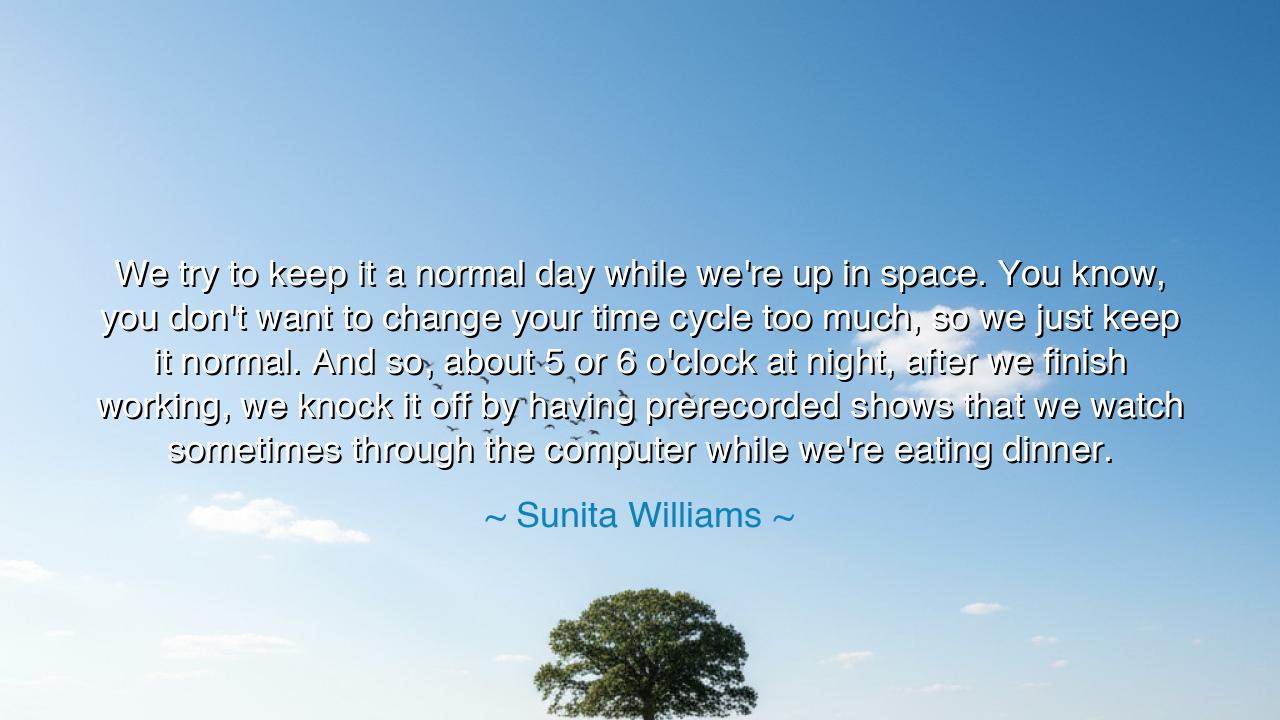
We try to keep it a normal day while we're up in space. You know
We try to keep it a normal day while we're up in space. You know, you don't want to change your time cycle too much, so we just keep it normal. And so, about 5 or 6 o'clock at night, after we finish working, we knock it off by having prerecorded shows that we watch sometimes through the computer while we're eating dinner.






Come, O children, and listen to the wisdom of Sunita Williams, a woman who has journeyed among the stars, yet remains grounded in the human experience. She said, "We try to keep it a normal day while we're up in space. You know, you don't want to change your time cycle too much, so we just keep it normal. And so, about 5 or 6 o'clock at night, after we finish working, we knock it off by having prerecorded shows that we watch sometimes through the computer while we're eating dinner." In these words, we hear not only of the vastness of space but of the need for routine, the human desire to hold onto the familiar even when surrounded by the unknown.
Consider, O children, the ancient philosophers who sought balance and harmony in their lives, not just in their thoughts, but in their daily rhythms. Aristotle, in his writings, spoke of the importance of habit in achieving the good life. He believed that virtue is cultivated through consistent practice and that even in the most extraordinary pursuits, one must maintain a sense of regularity. Sunita Williams mirrors this ancient wisdom—she knows that despite the profound experience of space exploration, maintaining a semblance of normalcy is crucial for mental health and well-being. Just as Aristotle emphasized the importance of structure in life, so too does Williams recognize that humans must hold onto familiar rhythms, even when far from home.
In the same way, O children, Williams’s words reflect the deep human need for connection to the familiar. Think of the great travelers of history—those who set sail to explore new worlds. Christopher Columbus, when he first embarked on his voyage to the New World, faced the uncertainty of vast, uncharted waters. Yet, even in the midst of that uncertainty, he kept his crew grounded in familiar routines: meals, rest, and work, for they knew that only through such routine could they maintain their strength and focus. Just as Columbus ensured stability through daily habits, Williams embraces the comfort of routine in space, using prerecorded shows and familiar rituals like eating dinner at a certain time, helping her and her crew remain connected to the rhythms of Earth even while in orbit.
There is a profound lesson in Williams’ words, O children. The vast expanse of space, like the great unknowns of life, can overwhelm us. But routine, the simple rhythms of daily life, can provide an anchor. The great philosopher Confucius said, "The superior man understands what is right; the inferior man understands what is profitable." In the same vein, Williams shows us that the superior way of navigating life’s challenges—whether on Earth or in the vastness of space—is through the commitment to maintaining what is right and familiar. Whether you are exploring the stars or facing the trials of everyday existence, keeping a sense of routine can help you maintain your focus, balance, and peace of mind.
Even the ancient warriors understood the importance of maintaining their daily habits. Alexander the Great, a conqueror whose reach spanned continents, would often hold daily councils and maintain strict training regimens for his men, even in the heat of battle. His soldiers, though far from home and embroiled in the chaos of war, found strength in their discipline and daily rituals. Like these warriors, Williams and her fellow astronauts find strength in their routines, using the quiet moments after work to watch a show, a simple act that allows them to unwind, recharge, and face the challenges of their extraordinary environment with renewed clarity.
O children, the wisdom of Sunita Williams is not just in her ability to travel to space, but in her understanding of the human condition. Routine, she teaches us, is not a burden, but a gift—it provides us with stability in times of uncertainty and comfort in times of upheaval. Whether you find yourself embarking on an extraordinary journey or facing the everyday struggles of life, the key to maintaining balance is to hold onto those small acts that ground you—whether it’s a familiar meal, a quiet moment of rest, or a simple ritual that connects you to your purpose.
So, O children, take this lesson to heart. In times of challenge and change, when the world around you may seem overwhelming and unfamiliar, remember the power of routine. Create small, daily practices that ground you, that remind you of what is constant, even when everything else is shifting. Just as Williams finds comfort in watching a show and sharing a meal in space, so too can you find peace and clarity by grounding yourself in the small, comforting rituals that make life more manageable. In this way, you will remain strong and centered, no matter where life’s journey takes you.






AAdministratorAdministrator
Welcome, honored guests. Please leave a comment, we will respond soon